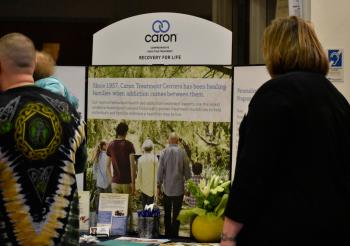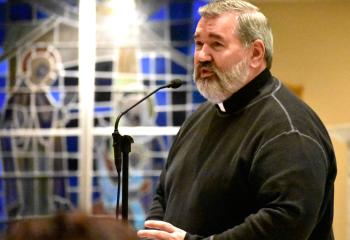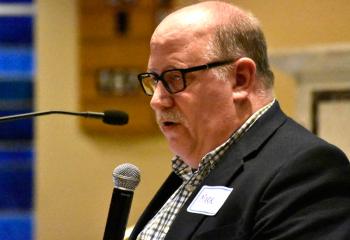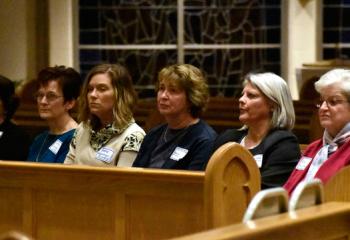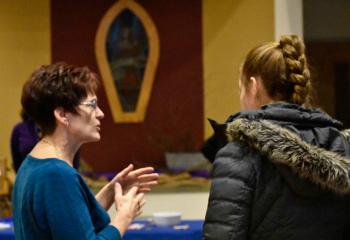By TARA CONNOLLY Staff writer
A ministry team devoted to people carrying the cross of addiction offered help, guidance and support March 12 during “From Despair to Hope – An Evening of Support for Those Impacted by Addiction and Those Who Love Them” at St. Ignatius Loyola, Sinking Spring.
The Addiction Ministry Team, which was formed in 2012 at St. Ignatius by Deacon William Autrey, hosted the event to highlight the spirituality of addiction and the necessity to seek help for the disease of addiction.
Father Thomas Bortz, pastor of St. Ignatius, spoke to an estimated 100 people and loved ones suffering from the effects of drug or alcohol addiction.
Admitting that he was not an expert on the disease, Father Bortz said priests have their fair share of counseling sessions due to the disease of addiction and sadly, a few funerals.
“God prepared me for my ministry by allowing me to be exposed to the life of an alcoholic,” said Father Bortz.
“Anyone who knows anything about addiction of any kind – be it drugs, alcohol, food, pornography, sex, shopping, gambling – understands that it is an extremely complex multi-factored, progressive and chronic physical disease.
“But nothing is ever one-dimensional with us. It’s never just physical or just emotional. And it holds true with addiction. It’s not just physical – there is a spiritual side to this disease.”
If loved ones are living an addictive lifestyle or are in recovery, Father Bortz said, spirituality is essential because it brings help, healing and hope.
“Spirituality largely refers to the belief in a higher power – one who governs the universe and is greater than you and I. It is the sense of a genuine connection to all living beings and the quest for self-knowledge, self-meaning, and purpose in one’s life,” he said.
“I name this higher power God and if you’re not ready to do that – I understand.”
When an individual uses and abuses his or her substance of choice, Father Bortz said, the usual outcome is a detachment or disconnection from the present moment.
“Addiction is a disease of isolation,” he said.
And as the individual sinks deeper and deeper into the disease, Father Bortz said, he or she becomes more isolated from others and oneself.
“Detachment has taken root and there are no signs of a life-giving connection with God or others,” he said.
“This lack of spirituality, this lack of connection to God and the larger community contributes to the isolation and perpetuates the addictive behavior.
“Through the profound efforts of recovery centers and the service of recovering individuals, those caught in addictive lifestyles are gently led back to the aspects of spirituality. They help re-establish healthy interpersonal relationships, make imperative connections with a higher power and thus regain a sense of self-worth.”
He also said no amount of wealth, beauty, fame, power, knowledge, achievement or success can replace the satisfaction and fulfillment when a person feels connected to something greater than themselves.
“So the value of a spiritual life for the recovering addict is immeasurable. What was missing from his or her world as he or she actively engaged in hopeless solutions now becomes a life-line for them,” said Father Bortz.
“Proven best practices for recovery often include a 12-step program, in which half of the steps make a direct reference to God. A few more imply a need for a contrite spirituality.
“So our Lord, our higher power, is the foundation of recovery. And with a healthy relationship, he will always carry us from despair to hope.”
In her presentation, Sarah Martinez, family counselor at Caron Treatment Center, Wernersville, discussed the phenomenon of “craving” and addiction as a progressive disease.
“When an addict or alcoholic introduces a chemical to their system, they develop an acute feeling for ‘me.’ They can’t predict if they will take one sip or hit or 20 hits or sips because they don’t know how much they will crave,” said Martinez.
She also said that most people don’t realize that addiction is actually an allergy because the body has an abnormal reaction to a common substance.
“When a nonalcoholic has a drink, they may have a pleasurable feeling or become more social,” said Martinez.
“But when an addict or alcoholic drinks or uses, their mind expands, they think more clearly, connect better with people, feel more in control and empowered. They feel ‘corrected,’ which is an abnormal reaction.”
Martinez stressed that substance abuse is the symptom of the disease and not the cause.
“A lot of people think they turn themselves into an addict or alcoholic. What’s interesting is that they accumulate a lot of consequences but the behavior doesn’t change,” she said.
According to Martinez, an addict or alcoholic can become clean and sober and then pick up again.
“How does that happen? That is the mental part of the disease. What happens in the brain is the crux of the problem,” she said.
Without treatment, Martinez noted that addicts and alcoholics are unable to develop coping skills to deal with withdrawal. In addition, she stressed that sobriety is very uncomfortable and painful for an addict or alcoholic.
“Newly sober and those who don’t seek treatment often obsess about alcohol or drugs. They glamorize it, fantasize about it and remember the relief it brings,” she said.
“A lot of alcoholics and addicts struggle with the piece of the brain that feeds them rational thought to drink or use. It feels like the brain is fighting with itself. It’s an exhausting way to live life. All they need is one idea to drink or use, and it can trump everything.”
When an individual fights the disease on their own, he or she will not win and will continue to suffer from chemical dependency, said Martinez.
“Freedom from the disease is possible. There are a lot of people lost and living the secret of addiction. There is a lot to be hopeful for. Recovery is an awesome thing – but you can’t fight it alone,” said Martinez.
The evening also featured a speaker in recovery, a speaker dealing with a family member trapped by the disease, and representatives from several organizations providing information about available services and support to those affected by the disease of addiction.
The Addiction Ministry leads meetings and prayer sessions at St. Ignatius. The team places recovery and treatment information at Diocesan parishes, submits prayers to the prayers of the faithful and strives to keep the plight of the addict on the minds of the parishioners.
Persons struggling with addiction can seek immediate help at: Berks County Alcoholics Anonymous, 610-373-6500; Pennsylvania Get Help Now, 717- 216-0905; Reading Health System 24-Hour Drug and Alcohol Center, 484- 628-8186; and Caron Treatment Center referral services, 800-678-2332.



